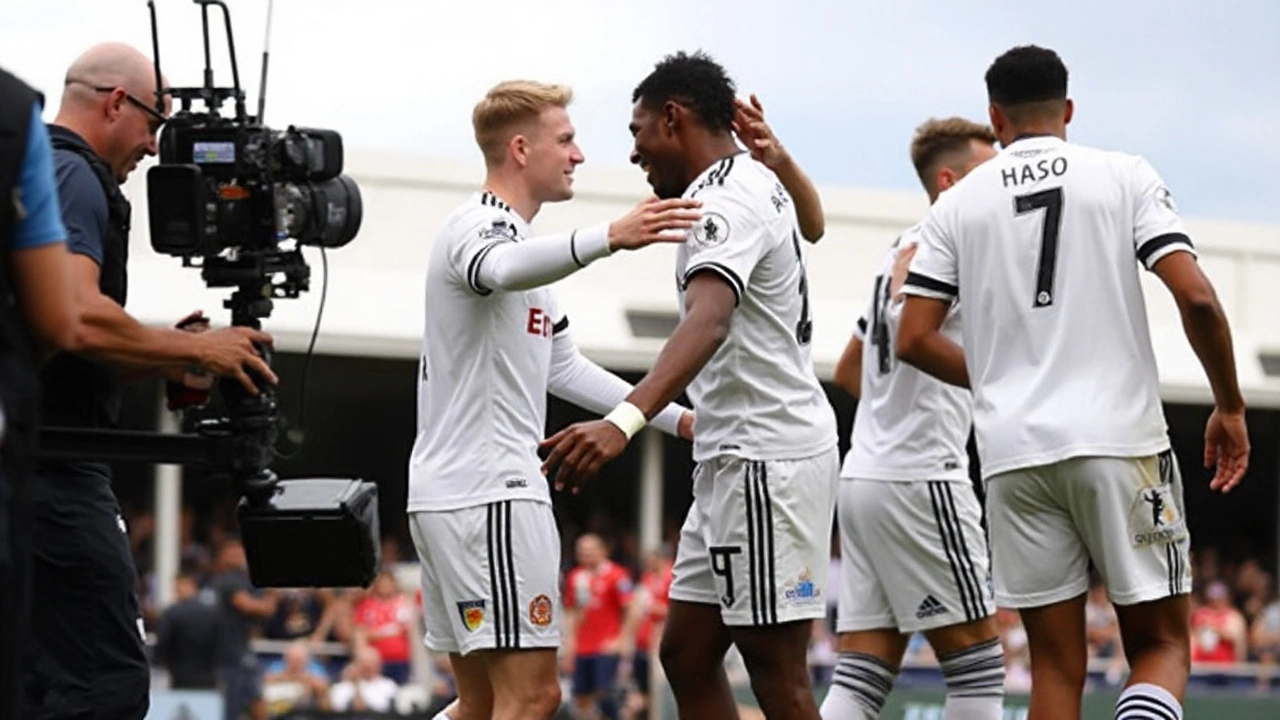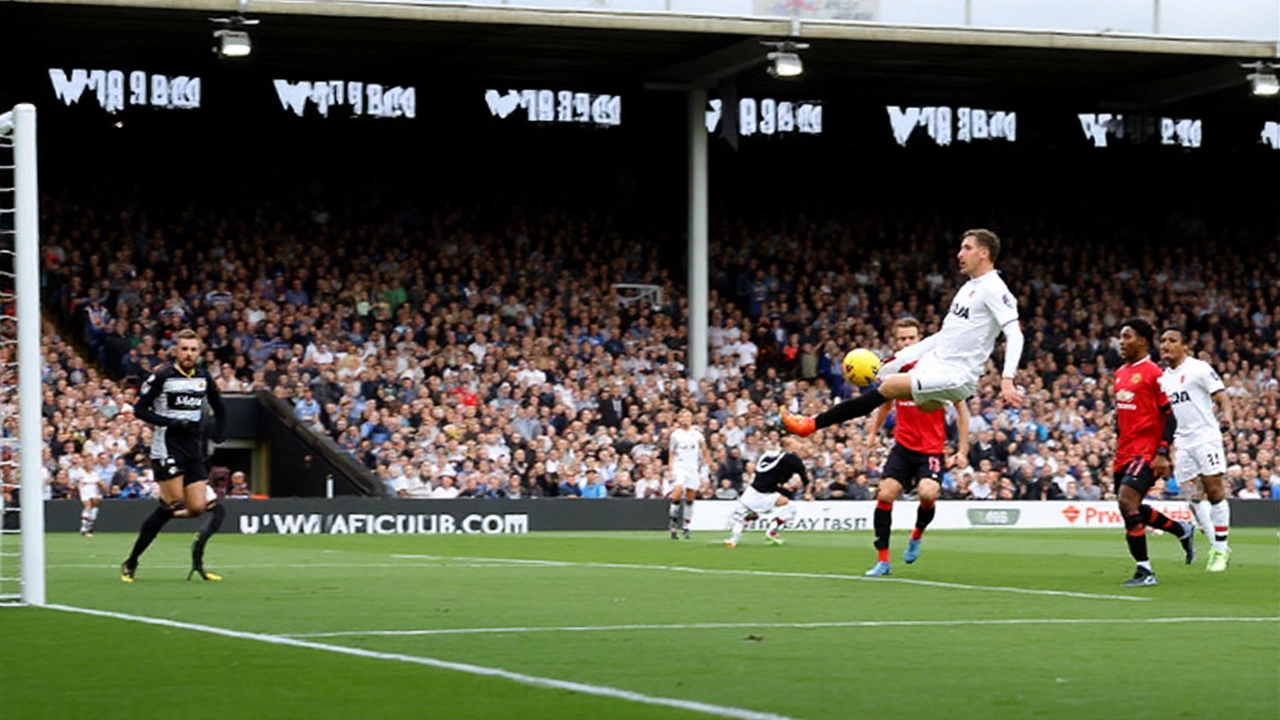Result and key moments
Ruben Amorim’s Premier League start at Old Trafford is still waiting for a spark. At Craven Cottage, Manchester United led through a deflected Leny Yoro header, missed a first-half penalty through Bruno Fernandes, hit the post via Matheus Cunha, and still slipped to a 1-1 draw when Fulham’s substitute Emile Smith Rowe found the corner with a precise equaliser. It was an eventful night that said as much about United’s growing pains as it did about Fulham’s stubborn edge.
United actually began on the front foot. The visitors moved the ball quickly, pressed high, and created the game’s first real threat when Cunha drove a skidding effort against the base of the post. That moment summed up United’s evening: the approach was sharp, the margin for error tiny.
The turning point of the first half arrived with the penalty. Fernandes, usually ice-cold from the spot, stepped up and thumped his effort over the bar. Craven Cottage exhaled, Fulham reset, and United’s early control lost its bite. Fernandes kept demanding the ball and tried to set the tempo, but that miss hung over the game.
After the break, United got the lift they needed. Yoro, who had been calm and tidy at the back with Matthijs de Ligt beside him, glanced a header goalward that nicked off Rodrigo Muniz and wrong-footed the keeper. It was scruffy, it counted, and it matched the defender’s dominant display in both boxes.
Amorim adjusted at half-time, bringing on Benjamin Sesko and Diogo Dalot to add thrust and width. The change pushed United higher and stretched Fulham’s back line. For a 15-minute spell, the visitors looked set to put the game away. Sesko won duels, Cunha spun into pockets, and Bryan Mbeumo darted into space. The goal felt close.
Fulham absorbed it, then struck. Smith Rowe, introduced from the bench, drifted into a pocket and finished cleanly across Altay Bayindir. The build-up was smooth and patient, the finish clinical. Bayindir, largely untested until then, had no chance.
United tried to finish strong. Harry Maguire came on late and nearly nicked it with a trademark header that slid inches wide. Dalot sent in a stream of crosses, Manuel Ugarte tightened midfield after replacing Mason Mount, and Luke Shaw’s shift at left-back gave way to the fresh legs of Heaven in the closing minutes. The winner never came.
Two games into the league season, Amorim has a draw and a defeat. There were signs of life—Cunha’s movement, Yoro’s authority, de Ligt’s composure, strong running from Chinazaekpere Dorgu down the left—but also familiar issues: a missed penalty, thin margins in the box, and a late goal conceded when control slipped.

What the performance told us
Amorim is not sitting still. His half-time reshuffle was bold, switching the rhythm and leaning into the pace and power up front. Dalot’s introduction gave United a true outlet on the right, and Sesko’s presence changed how Fulham defended their box. For roughly 20 minutes after the restart, United looked like a side that understood the manager’s plan. The problem is that moments don’t yet add up to results.
Up front, there was plenty to like. Cunha’s touch in tight spaces opened lanes for runners, and his link-up with Mount was smooth. Mbeumo stretched the pitch, pulled markers into bad areas, and created room for underlaps. But the final pass and the final touch weren’t quite there. It’s early, and new front lines rarely click instantly, but this one already shows a clear profile: direct, quick, and aggressive in transition.
Mount worked hard leading the line with Rasmus Hojlund left out amid transfer noise. He pressed, combined, and bought time for runners. What he didn’t get was the clear sight of goal a true No. 9 might find. When Sesko arrived at the break, United gained that focal point. He occupied both centre-backs, won first contacts, and created knockdowns. The chemistry with Cunha and Mbeumo will need reps, but the outlines are encouraging.
In midfield, Casemiro anchored early on, took a booking, and then made way. That decision was about control as much as energy. Ugarte’s later entry shored up the middle and allowed United to keep squeezing Fulham without being caught square in defensive transitions. Even so, the equaliser came from a sequence where United failed to disrupt the build-up. That’s the next step: turning pressure into repeated turnovers in the final third.
At the back, Yoro was the headline. Young defenders don’t often own Premier League away games, but he did most of it right—composure on the ball, strength in the air, good positioning. De Ligt read runners early and dealt calmly with direct play into Muniz. Shaw managed the left flank well before tiring, while Dorgu’s direct dribbling gave United an outlet and asked real questions of Fulham’s right side. Bayindir’s night was quiet until it wasn’t; he had little chance on the goal and otherwise did the basics cleanly.
Set pieces were a real weapon. Yoro scored from one, and Maguire almost did late. If United keep delivering with pace and attack those zones, they’ll bank goals even when open play stalls. It’s a small thing, but these are the margins that swing tight Premier League matches.
Now the obvious concern: the penalty. Fernandes has rescued United plenty from the spot, so a miss doesn’t rewrite the story. Still, the timing hurt. Score there and United likely control the game, manage the tempo, and ask Fulham to chase. Instead, the miss kept the door open. The captain kept creating and didn’t hide, which matters, but this squad can’t afford to waste high-value chances when the system is still bedding in.
There’s also the Hojlund question. When your out-and-out striker is missing and his future is uncertain, every chance that falls to a midfielder or wide forward gets magnified. The draw doesn’t hinge on that saga, but clarity will help Amorim set roles and build repetition. Sesko looks ready for a big load, and Cunha’s versatility gives options. If Hojlund stays, competition should sharpen the group. If he goes, the club will need to lock in a defined pathway for the No. 9 spot fast.
As for Fulham, credit where due. They were patient, took the sting out of United’s best spells, and punished a lapse. Marco Silva’s sides don’t fold at home, and the crowd rode the waves, especially after the penalty miss. Smith Rowe—an impact sub on the day—brought freshness and calm at the decisive moment. Muniz ran channels, asked questions, and was unlucky to see the opener flick off him and in at the wrong end.
Zooming out, United’s two-game sample isn’t a crisis; it’s a blueprint under construction. The football is more vertical, the press is coordinated, and the squad has new tools after a heavy summer. The £200 million invested in the final third—Sesko, Cunha, Mbeumo—doesn’t guarantee instant chemistry. It does demand a quick learning curve. You could see the partnerships forming: Cunha dropping to pull a centre-back, Mbeumo attacking the space behind, Dorgu overlapping with real pace, Dalot whipping early crosses. Now it needs repetition and, bluntly, cooler heads in front of goal.
What should change next? Not everything. Keep Yoro and de Ligt together to grow that understanding. Stick with the width that Dalot brings in the second phase of games. Keep using set pieces as a lever. And simplify the penalty routine: if Fernandes keeps the job, remove the hesitation—pick a corner and hit it; if not, decide the next taker and move on.
There was enough here for Amorim to build on: a controlled first half outside the miss, a well-worked opener, smart in-game tweaks, and late pressure that almost stole the points. The gaps are obvious and fixable: cutting out that one clean chance against, finishing at 1-0, and handling the game state after key moments. The Premier League doesn’t wait, but this didn’t look like a team lost at sea. It looked like one learning fast—and still paying for fine margins.
Player snapshots tell the story. Bayindir: tidy, beaten by quality. Yoro: leader’s display, plus a goal. De Ligt: steady and assured. Shaw: solid shift before cramp. Dorgu: fearless runner. Casemiro: combative, then protected. Fernandes: creator-in-chief, penalty regret. Amad: worked but was sacrificed for shape. Dalot: immediate impact with width. Mount: tireless, lacked a clean sight. Cunha: a menace, unlucky not to score. Mbeumo: lively, just needed one moment. Sesko: presence up top, threat to grow. Ugarte: control in traffic. Maguire: nearly the hero. Heaven: late legs to close space.
This felt like a missed chance for three points and a step forward at the same time. United’s new face under Amorim is clear; the end product isn’t. That’s the job now: turn intent into wins. The sooner this attack gels, the sooner nights like this turn from frustration into routine victories.
